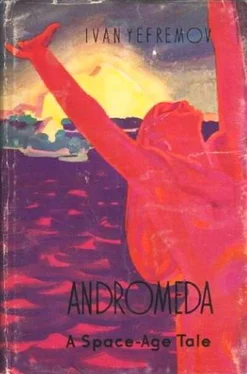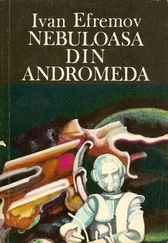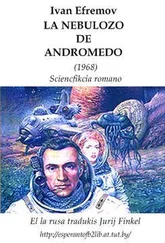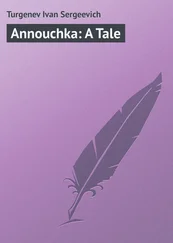Ivan Yefremov - Andromeda (A Space-Age Tale)
Здесь есть возможность читать онлайн «Ivan Yefremov - Andromeda (A Space-Age Tale)» весь текст электронной книги совершенно бесплатно (целиком полную версию без сокращений). В некоторых случаях можно слушать аудио, скачать через торрент в формате fb2 и присутствует краткое содержание. Город: Moscow, Год выпуска: 1959, Издательство: FOREIGN LANGUAGES PUBLISHING HOUSE, Жанр: Фантастика и фэнтези, на английском языке. Описание произведения, (предисловие) а так же отзывы посетителей доступны на портале библиотеки ЛибКат.
- Название:Andromeda (A Space-Age Tale)
- Автор:
- Издательство:FOREIGN LANGUAGES PUBLISHING HOUSE
- Жанр:
- Год:1959
- Город:Moscow
- ISBN:нет данных
- Рейтинг книги:5 / 5. Голосов: 1
-
Избранное:Добавить в избранное
- Отзывы:
-
Ваша оценка:
- 100
- 1
- 2
- 3
- 4
- 5
Andromeda (A Space-Age Tale): краткое содержание, описание и аннотация
Предлагаем к чтению аннотацию, описание, краткое содержание или предисловие (зависит от того, что написал сам автор книги «Andromeda (A Space-Age Tale)»). Если вы не нашли необходимую информацию о книге — напишите в комментариях, мы постараемся отыскать её.
Andromeda (A Space-Age Tale) — читать онлайн бесплатно полную книгу (весь текст) целиком
Ниже представлен текст книги, разбитый по страницам. Система сохранения места последней прочитанной страницы, позволяет с удобством читать онлайн бесплатно книгу «Andromeda (A Space-Age Tale)», без необходимости каждый раз заново искать на чём Вы остановились. Поставьте закладку, и сможете в любой момент перейти на страницу, на которой закончили чтение.
Интервал:
Закладка:
On the sea-coast opposite the statue, carved silver towers marked the beginning of a wide, white staircase that swept boldly over a thicket of stately trees with turquoise leaves.
“They ought to ring!” Darr Veter whispered in Veda’s ear, pointing to the towers and she nodded her head in agreement.
The camera of the new planet continued its consistent and soundless journey into the country.
For a second the five people saw white walls with wide cornices through which led a portal of blue stone; the screen carried them into a high room filled with strong light. The dull, pearl-coloured, grooved walls lent unusual clarity to everything in the hall. The attention of the Earth-dwellers was attracted to a group of people standing before a polished emerald panel.
The flame-red colour of their skin was similar to that of the statue in the sea. It was not an unusual colour for Earth — coloured photographs that had been preserved from ancient days recorded some tribes of Indians in Central America whose skin was almost the same colour, perhaps just a little lighter.
There were two men and two women in the hall. They stood in pairs wearing different clothing. The pair standing closer to the emerald panel wore short golden clothes, something like elegant overalls, fastened with a number of clips. The other pair wore cloaks that covered them from head to foot and were of the same pearl tone as the walls.
Those standing before the panel made some graceful movements, touching some strings stretching diagonally from the left-hand edge of the panel. The wall of polished emerald or glass became transparent and in time with the movements of the man and woman, clearly defined pictures appeared in the crystal. They appeared and disappeared so quickly that even such trained observers as Junius Antus and Darr Veter had difficulty in following the meaning of them.
In the procession of copper-coloured mountains, violet seas and amethyst trees the history of the planet emerged. A chain of animal and plant forms, sometimes monstrously incomprehensible, sometimes beautiful, appeared as ghosts of the past. Many of the animals and plants seemed to be similar to those that have been preserved in the record of the rocks on Earth. It was a long ladder of ascending forms of life, the ladder of developing living matter. The endlessly long path of development seemed even longer, more difficult and more tortuous than the path of evolution known to every Earth-dweller.
New pictures flashed through the phantom gleam of the apparatus: the flames of huge fires, piled-up rocks on the plains, fights with savage beasts, the solemn rites of funerals and religious services. The figure of a man covered by a motley cloak of coloured skins filled the whole panel. Leaning on a spear with one band and raising the other towards the stars in an all-embracing gesture, he stood with his foot on the neck of a conquered monster with a ridge of stiff hair down its back and long, bared fangs. In the background a line of men and women had joined hands in pairs and seemed to be singing something.
The picture faded away and the place of the tableaux was taken by a dark surface of polished stone.
At this moment the pair in golden clothing moved away to the right and their place was taken by the second pair. With a movement so rapid that the eye could not follow it the cloaks were thrown aside and two dark-red bodies gleamed like living fire against the pearl of the walls. The man held out his two hands to the woman and she answered him with such a proud and dazzling smile of joy that the Earth-dwellers responded with involuntary smiles. And there, in the pearl hall of that immeasurably distant world, the two people began a slow dance. It was probably not danced for the sake of dancing, but was something more in the nature of eurhythmics, in which the dancers strove to show their perfection, the beauty of the lines and the flexibility of their bodies. A majestic and at the same time sorrowful music could be felt in the rhythmic change of movement, as though recalling the great ladder of countless unnamed victims sacrificed to the development of life that had produced man, that beautiful and intelligent being.
Mven Mass fancied he could hear a melody, a movement in pure high tones played against a background of the resonant and measured rhythm of low notes. Veda Kong squeezed Darr Veter’s hand but the latter did not pay her any attention. Junius Antus stood motionless watching the scene, without even breathing, and beads of perspiration stood out on his broad forehead.
The people of the Tucana planet were so like the people of Earth that the impression of another world was gradually lost. The red people, however, possessed bodies of refined beauty such as had not by that time been universally achieved on Earth, but which lived in the dreams and the creations of artists and was to be seen only in a small number of unusually beautiful people.
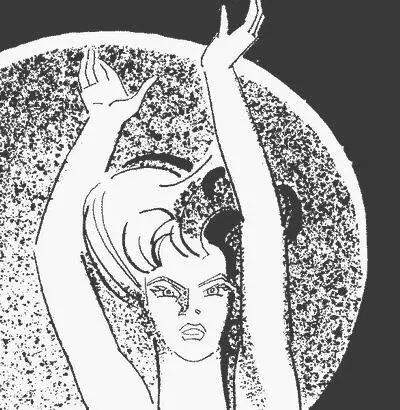
“The more difficult and the longer the path of blind animal evolution up to the thinking being, the more purposeful and perfected are the higher forms of life and, therefore, the more beautiful,” thought Darr Veter. “The people of Earth realized a long time ago that beauty is an instinctively comprehended purposefulness of structure that is adapted to definite objectives. The more varied the objectives, the more beautiful the form — these red people must be more versatile and agile than we are…. Perhaps their civilization has progressed mainly through the development of man himself, the development of his spiritual and physical might, rather than through technical development. Even with the coming of communist society our civilization has remained rudimentally technical and only in the Era of Common Labour did we turn to the perfection of man himself and not only his machines, houses, food and amusements.”
The dance was over. The young red-skinned woman came into the centre of the hall and the camera of the transmitter focussed on her alone. Her outstretched arms and her face were turned to the ceiling of the hall.
The eyes of the Earth-dwellers involuntarily followed her glance. There was no ceiling, or, perhaps, some clever optical illusion created the impression of a night sky with very large and bright stars. The strange combinations of constellations did not arouse any association. The girl waved her hand and a blue ball appeared on the index finger of her left hand. A silvery ray streamed out of the ball and served her as a gigantic pointer. A round patch of light at the end of the pointer halted first on one then on another star in the ceiling. In each case the emerald panel showed a motionless picture extremely wide in scale. As the pointer ray moved from star to star the panel demonstrated a series of inhabited and uninhabited planets. Joyless and sorrowful were the stone or sand deserts that burned in the rays of red, blue, violet and yellow suns. Sometimes the rays of a strange leaden-grey star would bring to life on its planets flattened domes or spirals, permeated with electricity, that swam like jelly-fish in a dense orange atmosphere or ocean. In the world of the red sun there grew trees of incredible height with slimy black bark, trees that stretched their millions of crooked branches heavenwards as though in despair. Other planets were completely covered with dark water. Huge living islands, either animal or vegetable, were floating everywhere, their countless hairy feelers waving over the smooth surface of the water.
“They have no planets near them that possess the higher forms of life,” said Junius Antus, suddenly, without once taking his eyes off the star map of the unknown sky.
Читать дальшеИнтервал:
Закладка:
Похожие книги на «Andromeda (A Space-Age Tale)»
Представляем Вашему вниманию похожие книги на «Andromeda (A Space-Age Tale)» списком для выбора. Мы отобрали схожую по названию и смыслу литературу в надежде предоставить читателям больше вариантов отыскать новые, интересные, ещё непрочитанные произведения.
Обсуждение, отзывы о книге «Andromeda (A Space-Age Tale)» и просто собственные мнения читателей. Оставьте ваши комментарии, напишите, что Вы думаете о произведении, его смысле или главных героях. Укажите что конкретно понравилось, а что нет, и почему Вы так считаете.
